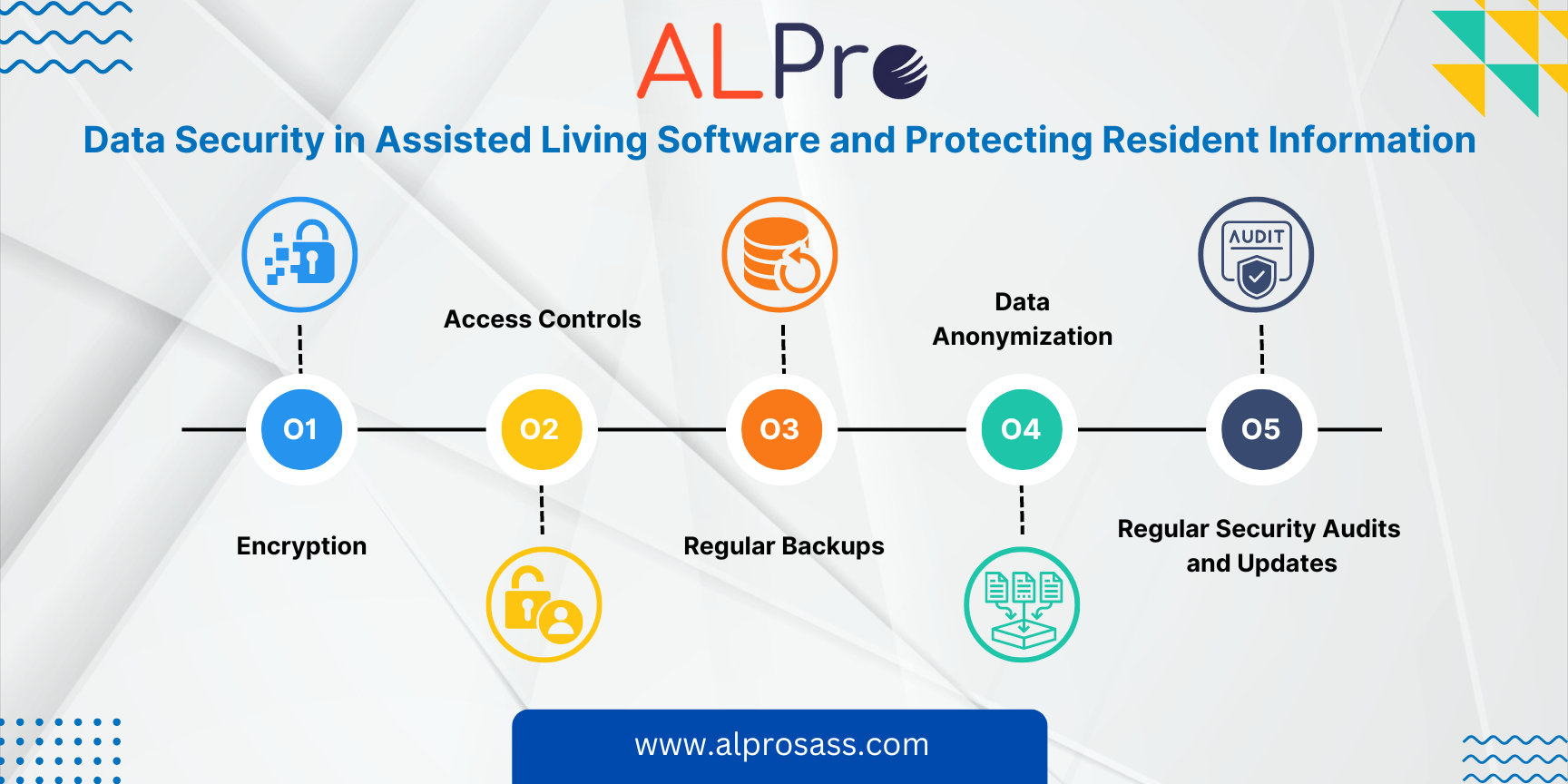Data Security in Assisted Living Software and Protecting Resident Information

The importance of data security in assisted living cannot be overstated. Assisted living facilities are responsible not only for the physical well-being of their residents but also for safeguarding their personal and medical information. Data security has become a critical concern due to the increasing dependency on digital systems to manage resident care. Ensuring that sensitive resident information is protected from breaches, unauthorized access, and data loss is paramount.
This blog explores the essential security features that assisted living software must have to protect resident data and maintain the trust of both residents and their families.
The Importance of Data Security in Assisted LivingAssisted living facilities manage a vast array of sensitive information, including medical records, personal identification details, and financial information. This data breach could have severe consequences, ranging from identity theft to legal penalties and reputational damage to the facility.
Given the sensitive nature of this information, facilities must implement robust security measures to protect resident data from external threats, internal risks, and accidental loss. Here are the must-have security features that should be integrated into any assisted living software.
1. EncryptionEncryption is the cornerstone of data security. It ensures that even if data is intercepted, it cannot be read or used without the correct decryption key. Assisted living software should employ robust encryption methods to protect data at rest (stored data) and in transit (data being transmitted). Key benefits of encryption include:
Data Protection: Encryption protects resident information from unauthorized access, ensuring sensitive data can only be viewed by authorized personnel.
Compliance: Encryption helps facilities comply with regulations such as HIPAA, which require the protecting of health information.
Peace of Mind: Knowing that encrypted data provides peace of mind to residents, families, and staff, reinforcing trust in the facility.
Access controls ensure that only authorized users can access sensitive information. Assisted living software should include granular access control features that allow administrators to define who can access data and under what circumstances. Adequate access controls include:
Role-Based Access: Access is granted based on the user's role within the facility. For example, caregivers may access medical records, while administrative staff may only access billing information.
Multi-Factor Authentication (MFA): This adds an additional layer of security by requiring users to provide two or more verification factors to access the system. This reduces the risk of unauthorized access due to stolen credentials.
Audit Logs: Detailed logs of user activity help track who accessed what data and when providing a trail that can be reviewed in case of a security incident.
Data loss can occur for various reasons, including hardware failure, cyberattacks, or human error. Regular backups ensure that resident information can be recovered during data loss. Essential aspects of backup strategies include:
Automated Backups: Assisted living software should perform computerized backups regularly to ensure the latest data is always available for recovery.
Offsite Storage: Backups should be stored in a secure offsite or cloud environment to protect against physical disasters like fires or floods.
Data Integrity Checks: Regular checks should ensure that backup data is complete, uncorrupted, and can be restored successfully.
In addition to encryption, data anonymization adds an extra layer of security by removing personally identifiable information (PII) from datasets used for analysis or reporting. This ensures that even if data is compromised, it cannot be traced back to individual residents. Key points about data anonymization:
Minimized Risk: Anonymized data reduces the risk of exposure in a breach, as the data cannot be linked to specific individuals.
Regulatory Compliance: Data anonymization helps facilities comply with data protection regulations that require minimizing PII.
Useful for Research: Anonymized data can still be used for research, analytics, and reporting without compromising resident privacy.
Cyber threats are constantly evolving, and so should the security measures employed by assisted living facilities. Regular security audits and software updates are essential for identifying vulnerabilities and ensuring the software remains resilient against new threats. Best practices for security audits and updates include:
Routine Audits: Regularly audit the software's security features to identify and address any weaknesses or vulnerabilities.
Software Patching: Ensure that the software is regularly updated with the latest security patches to protect against known vulnerabilities.
Training and Awareness: Staff should be regularly trained on security best practices and emerging threats to ensure they are prepared to respond appropriately.
In the assisted living industry, data security is not just a technical requirement but a moral and legal obligation. Protecting resident information is critical to maintaining trust, ensuring compliance, and providing high-quality care. By incorporating essential security features such as encryption, access controls, regular backups, data anonymization, and ongoing security audits, assisted living facilities can safeguard sensitive data against an ever-growing array of threats.
ALPro protects resident information through a comprehensive approach that includes advanced encryption techniques to secure data at rest and in transit. We implement strict access controls, ensuring only authorized personnel can access sensitive information. Regular security audits are conducted to identify vulnerabilities and ensure compliance with legal standards. Additionally, ALPro utilizes data anonymization methods to protect resident identities during analysis and reporting. This multi-layered strategy safeguards personal data and fosters trust and confidence among residents and their families.
